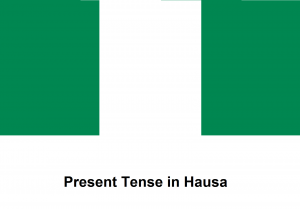Language/Hausa/Grammar/Present-Tense
Hello Everyone, 😊
In today’s lesson we are going to study the following topic: ”PRESENT TENSE” in Hausa.
Please feel free to edit this page if you think it can be improved!
Consider exploring these related pages after completing this lesson: Future Tense, Conditional Mood, Questions & Adjectives.
How to Form the Present Tense in Hausa
The present tense in Hausa is formed by adding specific suffixes to the verb stem. The suffixes vary depending on the subject pronoun, so let's start by learning the subject pronouns in Hausa:
- Ina (I)
- Ka (You - singular)
- Shi (He)
- Tana (She)
- Mun (We)
- Ku (You - plural)
- Su (They)
Now let's see how to form the present tense in Hausa for each subject pronoun:
- Ina: Add "na" to the verb stem. For example, "Ina zama" means "I am coming."
- Ka: Add "ka" to the verb stem. For example, "Ka tafi" means "You are leaving."
- Shi: Add "a" to the verb stem. For example, "Shi tafi" means "He is leaving."
- Tana: Add "ta" to the verb stem. For example, "Tana gaji" means "She is running."
- Mun: Add "mu" to the verb stem. For example, "Mun gaji" means "We are running."
- Ku: Add "ku" to the verb stem. For example, "Ku zama" means "You all are coming."
- Su: Add "su" to the verb stem. For example, "Su tafi" means "They are leaving."
It's important to note that the verb stem doesn't change in the present tense, only the suffix changes depending on the subject pronoun.
Practice
Now that we've learned how to form the present tense in Hausa, let's practice using it in sentences:
- Ina tafi zuwa sokoto. (I am going to Sokoto.)
- Ka kawo kuskuren shi. (You bring the food to him.)
- Shi ya kashe ita. (He killed her.)
- Tana kawo karfi. (She brings the money.)
- Mun yi maganar soyayya. (We talk about love.)
- Ku shiga waje. (You all enter the room.)
- Su fita daga hanyar.
By mastering the present tense in Hausa, you will be able to communicate more effectively and confidently in everyday conversation.
Present Tense Conjugation - Examples
| ENGLISH | HAUSA | ENGLISH PRONUNCIATION |
|---|---|---|
| I love | Ina so | ih nah soh |
| You love | kana so | kah nah soh |
| He loves | Yana so | yah nah soh |
| We love | Muna so | mou nah soh |
| You love | Kuna so | kou nah soh |
| They love | Suna so | sou nah soh |
| I speak | Ina magana | ih nah mah gah nah |
| You speak | kana magana | kah nah mah gah nah |
| He speaks | Yana magana | yah nah mah gah nah |
| We speak | Muna magana | mou nah mah gah nah |
| You speak | Kuna magana | kou nah mah gah nah |
| They speak | Suna magana | sou nah mah gah nah |
| I sleep | Ina barci | ih nah bahr chih |
| You sleep | kana barci | kah nah bahr chih |
| He sleeps | Yana barci | yah nah bahr chih |
| We sleep | Muna barci | mou nah bahr chih |
| You sleep | Kuna barci | kou nah bahr chih |
| They sleep | Suna barci | sou nah bahr chih |
| I eat | Ina ci | ih nah chih |
| You eat | kana ci | kah nah chih |
| He eats | Yana ci | yah nah chih |
| We eat | Muna ci | mou nah chih |
| You eat | Kuna ci | kou nah chih |
| They eat | Suna ci | sou nah chih |
Other Lessons
- Definite Articles in Hausa
- Questions
- Future Tense
- Conditional Mood
- Pronouns
- Gender
- Plurals
- Past Participle in Hausa
- Past Tense

